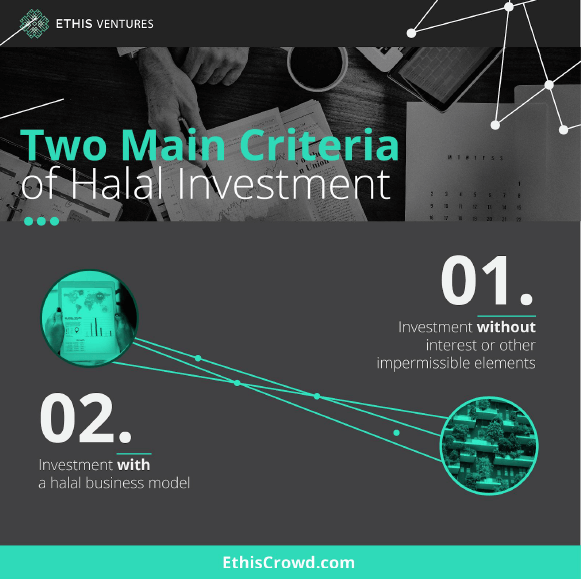
Nearly a quarter of the world’s population are Muslims and yet, Halal investment opportunities in America are still limited and less than 1% of financial assets are Sharia-compliant. However, that is all going to change.
According to a report by the Malaysia International Islamic Financial Centre (MIFC) in 2017, the Islamic fund industry is on the rise due to a greater demand for Sharia-compliant investments. This is resulted from the increasing Islamic financial assets available on the market.
Ernst & Young (2011) and Cerulli (2011) reported that the assets of Islamic finance institutions are expected to grow 15% annually, predicting vigorous demand for Islamic investment.
In Islamic investment, every business must adhere to the Halal standards as a requirement. In other words, each Islamic-based business that is eligible for Islamic investment should invest in projects or companies that are aligned with Sharia principles which strictly prohibit investments in debt and traditional fixed-income securities.


Two Categories of Halal Investment
There are two main criteria for Halal investment:
1. Investment without interest or other impermissible elements
Earning income from interest is strictly prohibited in Islam. Interest (termed as riba) is the debt or exchange of a commodity for an extra value or service. Besides riba, investments also need to be free from uncertainty (gharar). Contracts and agreements must have full disclosure, leaving no room for excessive uncertainty over the subject-matter of the contract. In addition, the nature of investments must be free from excessive speculation or gambling (maysir).
Loan stocks and bonds are examples of investment products ruled out as Sharia non-compliant as they make profits via interest. However, despite the investment prohibitions on these products, many investment opportunities are still available to be invested by Muslims including various shares, real-estate investment funds and unit trusts.
2. Investment with a halal business model
A halal business model eliminates businesses that engage in haram and forbidden activities such as alcohol-related engagement, interest-based transactions and gambling.
For an investment to be considered as halal, in particularly stock, it has to comply to certain metric specifications validated by Shariah scholars. To date, no consensus has been reached in the specifications’ implementation such as screening standard, stock exchange and jurisdiction as different countries may have different parameters.
For instance, in the case of debt, the Shariah Advisory Council of the Securities Commission Malaysia considers an investment to be halal if the ratio of interest-bearing debt total asset is not more than 33%. Accounting and Auditing Organization for Islamic Financial Institutions (AAOFI) on the other hand, set the benchmark of the interest-bearing debt of the market capitalisation to be lower than 30%.
Drawbacks of Savings Account
In 2017, the American Muslim population is estimated to be at 3.45 million. The number is expected to grow to 8.1 million by 2050 as stated by Pew Research Center. As the Muslim population keeps growing, the demand for halal investments is also increasing.



It is not permissible for Muslims to seek capital appreciation from conventional saving accounts as the interest-based return of these accounts is not permissible in Islam.
Therefore, in order to seek a Halal capital appreciation, Muslims would need to save up or invest in a Muslim friendly (Islamic) financial institutions. In America, although such institutions exist, it is still limited in number.
In addition, the American economy and monetary systems are designed in such a way that money loses its value over time. With the exact same amount of money, you cannot buy the same things you can now in as little as 3 to 5 years later. The best example could be illustrated by the increasing prices of groceries over time due to general inflation.
Trying to save money for larger expenses in life such as Hajj, retirement or higher education is like aiming at a moving target. Thus, most Muslims are forced to seek multiple money investment avenues to attain these.
Opportunities in America
For Muslims who are looking to get started in investment in America, there are numerous options available today for halal-friendly investments.
1. Wahed Invest
One of the available halal investment platforms is Wahed Invest LLC, a New York based company. Wahed allows people to invest in halal financial assets such as Global Equities, Islamic bonds, Gold, and Emerging Market Equities where returns are based on profits from underlying assets.
According to Forbes and TechCrunch, the platform is the world’s first halal robo – advisor established to match small and big investors to the right investment projects that meet the Halal investment standards.
Wahed allows investors to open an account and start investing with just $100. This platform proves that halal investment can be done easily by utilising the use of technology and at a low cost.
2. Iman Fund
In response to the needs of Muslim investors in the U.S., The Iman Fund (IMANX) was established to provide Muslims with investment options that are Sharia-compliant. They invest in companies that adhere to Sharia, at the same time making profits from the investments.
Iman Fund offers the following benefits for its investors:
a. Diversification: the fund offers diversification with a portfolio of more than 100 Sharia-compliant companies in different business sectors
b. Low Fee: the fund has one of the lowest annual fees when it comes to Sharia-compliant funds
c. Accessibility and Flexibility: the fund is available at Charles Schwab One Source, Ameritrade, Scottrade, VanGuard 401K Plans and TD Waterhouse
d. Active Portfolio Management: Strategy is determined by the Investment advisor based on several factors such as record of earnings growth
Source: http://www.investaaa.com/.
With the increasing number of platforms for American Muslims to invest in, the opportunity to be involved in halal investments should not be missed. The active involvement of the public in halal investments will result in even more opportunities for Islamic products to be introduced and expanded in the near future, inshaallah.
To ensure that an investment is Halal, it is recommended that investors conduct additional research or consult those with a sound knowledge in Islamic/Halal investment to ensure that the desired projects or companies adhere to the Islamic principles. This is to ensure that your investment capital will be handled in a proper way and ultimately, gives you a Halal return.
Read more about Equity Crowdfunding





Top Posts
Islamic P2P Crowdfunding Explained
Halal Money Matters: How Muslims Can Balance Deen and Dunya with Smart Islamic Finance
Halal Investments for Singapore Muslims? It’s time for a shake-up in the Islamic Investments scene.
Smart investment for making Halal money
3 Reasons Why Property Crowdfunding is the Smart Investment for You